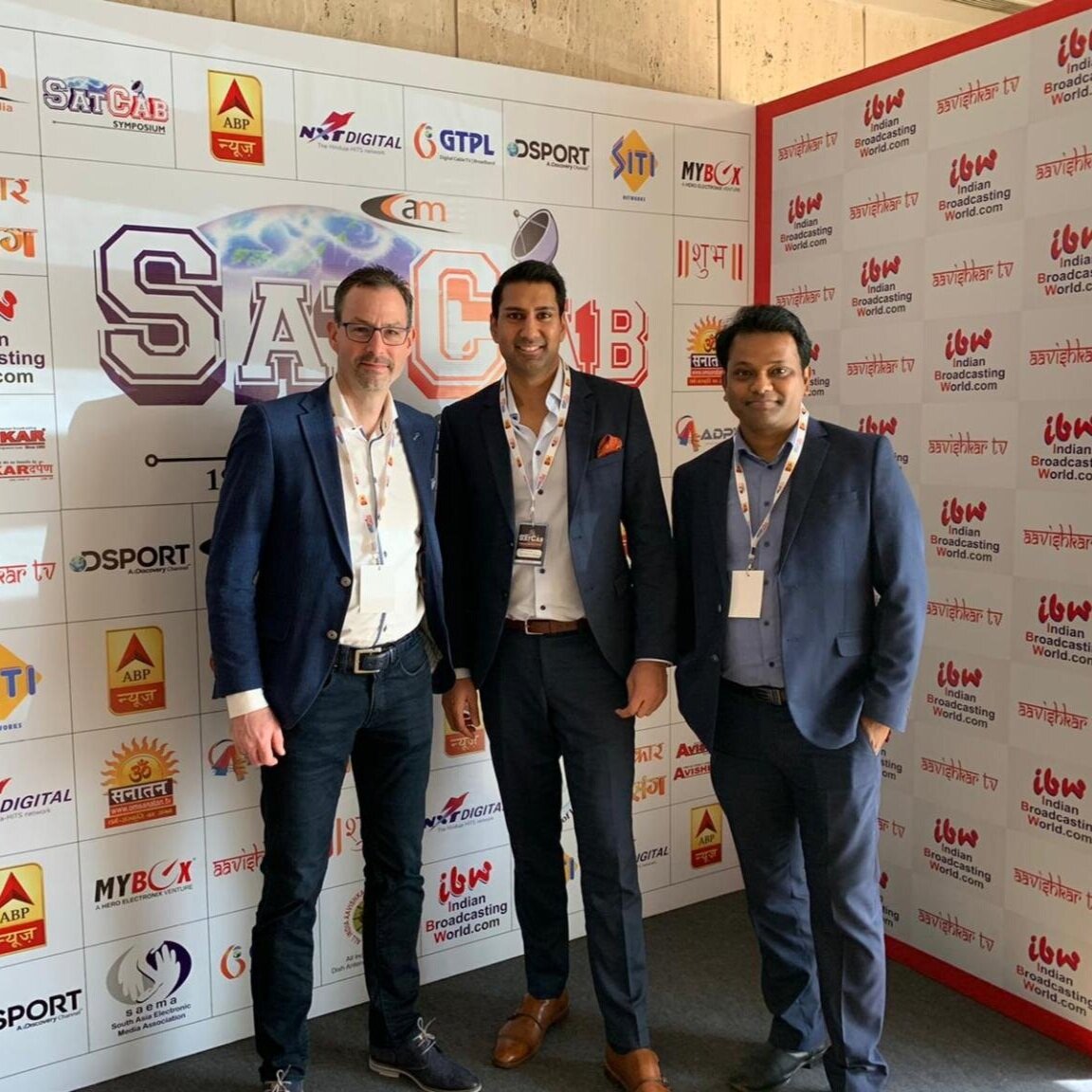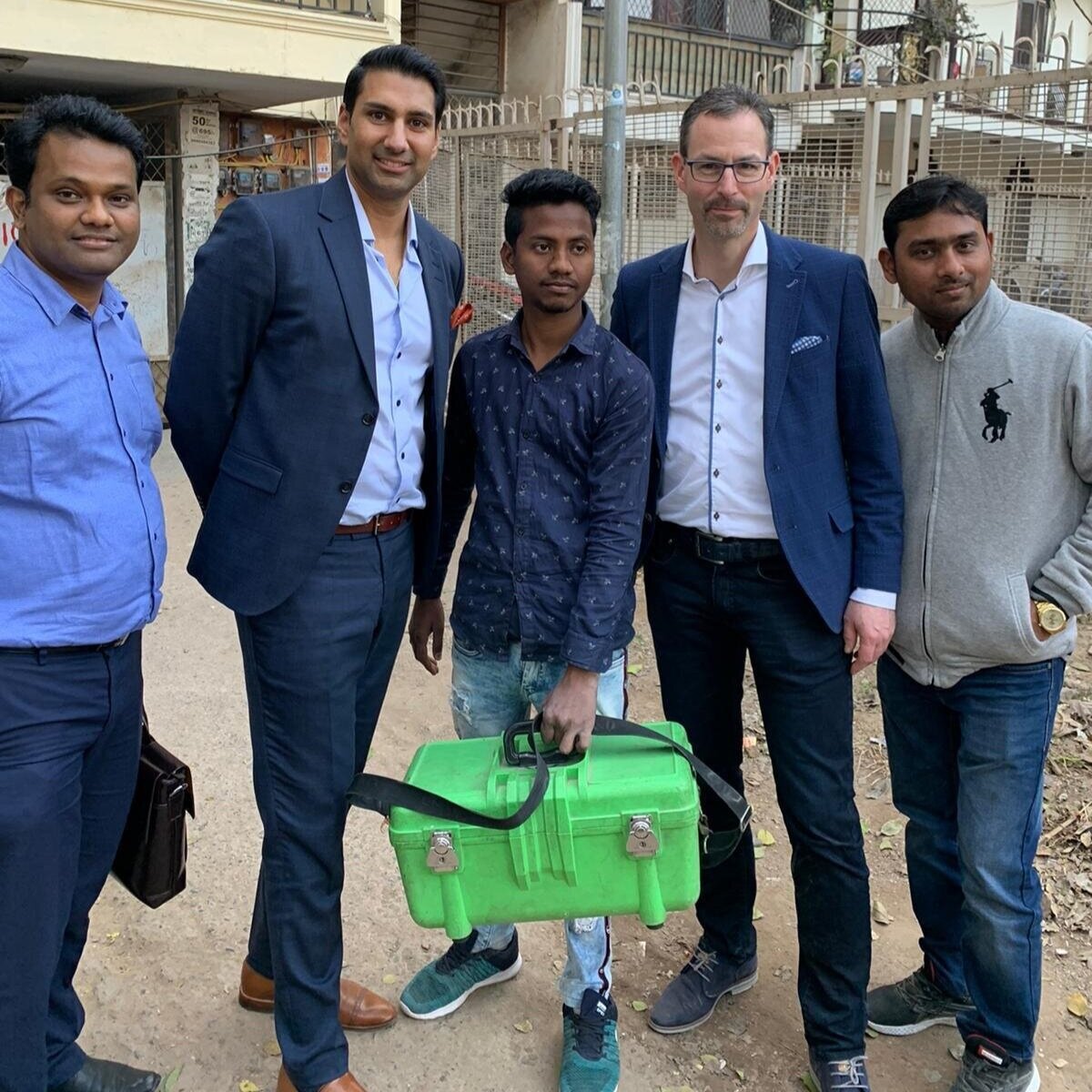India is in lockdown, but from home the Indian IT industry is still keeping the back offices of large and small internationals running. And that's an interesting development for Genexis, the European market leader in fiber optic modems. Indeed, the Brabant-based company is not only in poll position in the EU, but sister company GX Group is also leading the fiber optic market in India. "Now that India is locked in, you can see the country's rapid adaptability. One thing is certain: the corona lockdowns will make broadband a priority in India," says Genexis CEO, Gerlas van den Hoven.
Left: Gerlas van den Hoven and center: Paritosh Prajapati
Since the lockdown was declared, Genexis India employees have also been working from home. According to Gerlas, this change is more smooth than expected: "Most have a broadband connection at home with no more than a few Mbps and yet our software engineers manage to deliver good work." Research shows that Indian companies have significantly scaled up home working capabilities in a short period of time. The number of companies offering remote work capabilities since the lockdown has increased from 20% to 96%. "That's giving our industry, especially in India, a boost," he says.
Find sales team, set up Private Limited and go!
Genexis India, now GX Group, has now been making inroads in the Southeast Asian country for 7 years. "Unlike most companies, we didn't go to India with the intention of outsourcing or setting up an R&D team," Gerlas explains. "It all started with one of our sales people, Paritosh Prajapati, who was working for our branch in Sweden. He saw a lot happening in the fiber optics field in India and approached us if he couldn't do some market research there. 'Why not,' we thought and sent him with a business developer in that direction."
From that point on, things moved quickly. "He immediately saw that there were opportunities for us in the Indian market, but how to start a business there, Paritosh knew as little as we did." According to Gerlas, it is essential to have someone on the ground who you trust and who understands the culture and the language. "Not only did Paritosh have a good sales team together in no time because of his good contacts, he was also able to find the right people to take care of things he didn't know about himself such as a PAN number, taxes and permits." Taking the plunge, Genexis set up a private limited, rented an office and took off.
'For a well-functioning R&D team in India, you need a local manager who understands Europe and India'
For the first four years, Genexis could only just keep its head above water in India. Small projects were brought in, but it didn't pay off. "Instead of closing down and taking a loss, we adjusted our expectations and chose to press on. India is not a country where you go for the short term and so we decided to invest heavily in two things."
First, an R&D team was established to develop software for the European market. Genexis had been suffering from a shortage of good engineers for some time and was unable to fill the vacancies in Europe. "In India, the supply of software people was much greater and also came with a much lower price tag." With Paritosh at the head of the Indian branch, they also had a very good 'translation bridge' between Europe and India. "Because Paritosh is a Swede, he understands exactly what quality we want in Europe, but because of his Indian background he can also perfectly translate that to the Indian way of working. Someone like that is essential if you want to succeed as a European company in a country like India.
'Winning government contract? Then you need to show your face'
Investments were also made in sales in India. To figure out why Genexis products were not in demand, Gerlas and his team took a close look at the Indian market. "We went to several places to see how fiber optics are installed in India and that was an eye opener. For example, it is quite normal to tie the fiber optic cables to poles or pull them over trees. I also went to look inside someone's house and then you see the fiber optic cable go through the window into the living room, where it then lies like a bunch in the corner with the modem on top. It was immediately clear that our fancy European modems were a total mismatch with the needs of Indian consumers and that we needed to start offering a total solution."
A simple modem for consumers and corresponding central equipment for Internet service providers, proved to be the gap in the Indian market. Genexis is now widely involved in local projects. "In wealthy neighborhoods, fiber optic cable is being rolled out en masse. We then seek out the local cable club, and they are often very interested in our total solutions, because they fit in well with the wishes of the Indian user. Our product is perhaps a tad more expensive than average, but it is the simplest to maintain and install and that makes us an interesting party." Gerlas advice for entrepreneurs who want to compete for government contracts is to be patient. "In India you have to be present, you have to show your face. We have been here seven years and have worked on so many projects that we are a now established name. That builds confidence."
Payment morale in India
It's not all hosanna for Genexis in India. "We have now experienced more than once that an Indian customer places a large order, but does not pay the bills after we have delivered. Then you notice again how handy it is to have someone in your team who knows both cultures. For example, you shouldn't bang your fist on the table just three days after the payment deadline has passed. But you also can't allow a customer like that to say, 'just come and get the goods again'. You have to have the courage to stand firm and eventually take the step to court if necessary."
According to the CEO of Genexis, you don't take that legal step to get your money, but to show that you dare to file a case. "The risk for a Dutch company is small, an Indian lawyer is comparatively cheap and you lose a maximum of about 10,000 to 15,000 if the law is not decided in your favor." But the most important thing, according to Gerlas, is that once you've made the trip to court, it's often not necessary to take such a drastic step in a subsequent dispute. "We have proven to be a serious European company and that has status. The Indian companies we work with often also have a reputation in their sector and would rather not risk it, so they choose eggs for their money."
'Building rapport with your staff is a hundred times more important in India than anywhere else'
Genexis India has been split off from the Dutch part for a year now and continues under the name GX Group with Paritosh as CEO. Its ambitions for the future are high. "We are now at poll position in this market and we expect India to roll out broadband at a rapid pace in the next five years in addition to the mobile network." That prediction now seems to be accelerating due to the corona virus, but GX Group has also had to endure some minor setbacks due to the outbreak. For example, a major event that GX Group was going to organize for their industry for the first time this year could not take place in February.
"Very unfortunate of course, as we wanted to use this event to launch the new name GX Group and reposition ourselves in the market. But more importantly for us, we were still able to celebrate our annual staff party in time. India is a real family country, so building a bond with your staff is a hundred times more important than anywhere else. The fact that we were all able to get on the dance floor one more time before the country locked down is a great reminder during this crazy time."


